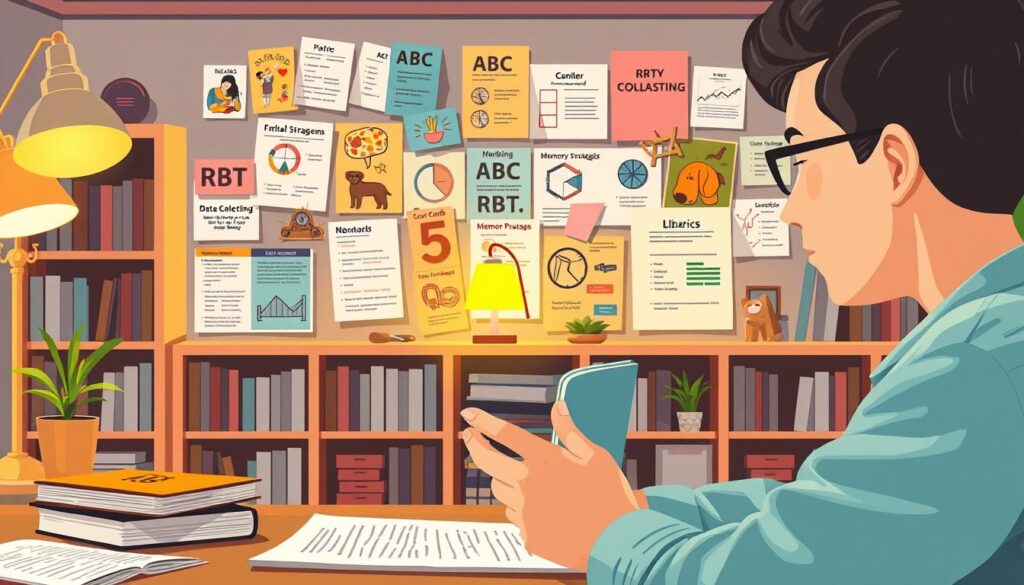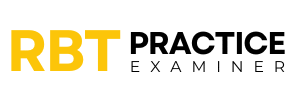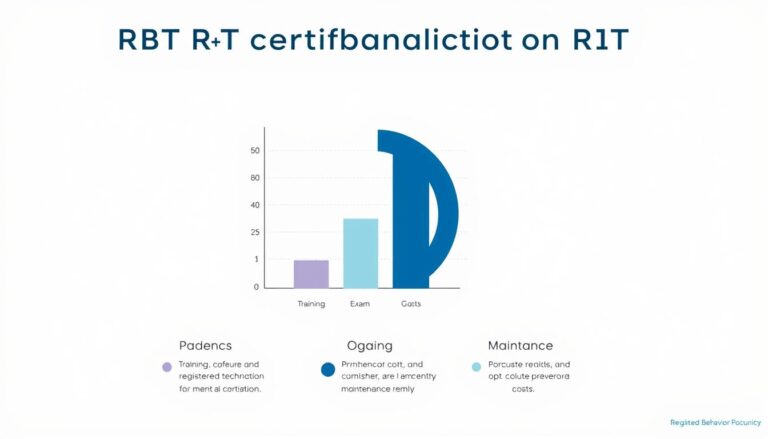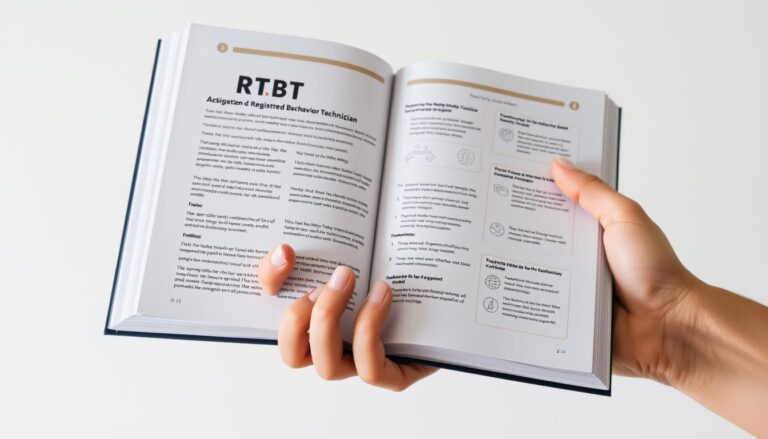Improve Your RBT Study Routine with These Tips
Becoming a Registered Behavior Technician (RBT) needs hard work and smart planning. Learning how to study better for RBT can make your journey easier. The key is to find good study tips that help you learn more.
Aspiring RBTs have to deal with tough study subjects. They need to understand complex behavior analysis and follow detailed tasks. Our guide will show you how to study well and feel confident.
Knowing the best study methods can really help you pass the RBT test. We’ll share tips on how to learn better, manage your time, and improve your skills in applied behavior analysis.
If you’re starting your RBT path or want to improve your study skills, this guide is for you. You’ll learn how to overcome study challenges, boost your knowledge, and feel more confident about your certification.
Understanding the RBT Certification Requirements
To become a Registered Behavior Technician (RBT), you need to know the specific requirements. The first step is to understand the core parts and what you need before starting your career in applied behavior analysis.
Those wanting to be RBTs must go through several important steps. These steps show they can handle behavioral intervention techniques well.
Core Components of RBT Training
Good RBT studying starts with a detailed training. This training covers key skills for behavioral interventions. The process includes:
- 40-hour supervised training program
- Competency assessment by a BCBA
- Comprehensive understanding of behavior reduction strategies
- Mastery of measurement and documentation skills
Essential Documentation and Prerequisites
Candidates need to prepare several important documents for RBT certification:
- High school diploma or equivalent
- Clean background check
- Proof of completed 40-hour training
- Recommendation from supervising BCBA
Timeline for Certification Completion
The RBT certification process usually takes 2-3 months from starting training to getting certified. It’s important to plan your study well to move smoothly through each step.
Being well-prepared and knowing what’s needed will help you succeed in getting your RBT certification.
Creating an Effective Study Schedule for RBT Exam
Creating a good study plan is key to passing the Registered Behavior Technician (RBT) exam. Start by making a study schedule that fits you well. This schedule should help you learn as much as you can.
First, check what you know and how much time you have to study. A good study plan must fit your work, family, and how you learn best. Divide the RBT study list into smaller parts. Then, set aside specific times for each part.
- Identify your peak learning hours
- Create a consistent daily study schedule
- Set specific, measurable goals
- Use time-blocking techniques
Here are some important tips for planning your studies:
- Time Management: Spend 1-2 hours each day on focused study
- Goal Setting: Make weekly learning goals
- Progress Tracking: Keep track of your progress with a study journal or app
Being flexible is important in your study plan. Life can change suddenly, so make a schedule that you can adjust easily. Instead of long study sessions, try short, regular ones.
The best study plan is one you can stick to. Make your plan fit your learning style. And don’t be afraid to change it as you go along with your RBT exam prep.
Practical Advice for Improving RBT Study Habits
Getting good at studying is key for RBT certification success. You need a plan that uses different learning methods. This way, you can better understand and remember important behavioral analysis ideas.
Learning how to study well for RBT involves some important strategies. These can really change how you learn. Let’s look at some practical ways to make your study time better.
Time Management Techniques
Managing your time well is the first step to studying effectively. Here are some effective tips:
- Use the Pomodoro Technique: Study in 25-minute focused intervals
- Create a dedicated study schedule
- Prioritize most challenging materials during peak energy hours
Note-Taking Strategies
Good note-taking can really help you learn and remember better:
- Implement the Cornell Note-Taking Method
- Use color-coded highlighting for key concepts
- Create visual mind maps for complex topics
Active Learning Methods
Studying isn’t just about reading. Try these interactive ways to learn:
| Active Learning Technique | Benefits |
|---|---|
| Self-Quizzing | Improves memory retention and identifies knowledge gaps |
| Teaching Concepts | Deepens understanding through explanation |
| Flashcard Creation | Enhances recall and quick concept review |
Remember, consistent practice and a diverse approach to studying are key to RBT certification success.
Essential RBT Study Materials and Resources
Getting ready for the Registered Behavior Technician (RBT) exam needs a smart plan for study materials. A good RBT exam study guide uses many resources. This ensures you understand all important concepts well.
Key study materials for those aiming to be RBTs include:
- Official BACB Task List Manual
- Recommended textbooks on Applied Behavior Analysis
- Online training courses
- Practice examination packages
- Digital flashcard applications
Practical tips for better RBT study habits are to mix up your learning sources. Digital tools offer interactive learning that adds to traditional studying.
Recommended study resources include:
- Behavior Analyst Certification Board official website materials
- Specialized online training programs
- Professional ABA journals and publications
- Recorded webinars from experienced practitioners
Choosing the right study materials boosts your chances of passing the RBT certification exam. Look for resources that show real-world uses of behavioral techniques.
Always check if your study materials are trustworthy. Stick to resources backed by professional behavioral analysis groups.
Mastering Task List Components
Getting ready for the Registered Behavior Technician (RBT) certification needs a smart plan. It’s important to break down big ideas into smaller parts. This makes learning easier and more complete.
Good RBT students focus on three main areas. These areas are the heart of their job. Learning these well helps them do well in tests and real work.
Measurement and Assessment Techniques
Being precise in measuring and assessing is key for RBTs. They need to be good at:
- Getting accurate data on behavior
- Understanding graphs and pictures of data
- Using standard ways to assess
Behavior Reduction Strategies
Knowing how to reduce bad behavior is important. RBTs need to know how to:
- Find the right behaviors to work on
- Do functional behavior assessments
- Make plans to reduce bad behavior
Documentation Requirements
Keeping good records is a big part of the job. RBTs must focus on:
| Documentation Component | Key Requirements |
|---|---|
| Client Progress Reports | Detailed, objective observations |
| Intervention Logs | Tracking behavioral interventions well |
| Supervision Notes | Notes on professional guidance |
By getting good at these areas, RBTs build a strong base for their career. Practicing regularly and understanding well helps them handle the tough parts of their job.
Effective Memory Techniques for RBT Concepts

Learning memory techniques is key for acing the RBT exam. The right methods can change how you study and help you keep up with tough concepts.
For top-notch RBT exam prep, you need creative memory tools. Mnemonic devices are great for learning and remembering important details.
- Visualization Techniques: Make mental pictures that link key behavioral ideas
- Spaced Repetition: Review materials at longer intervals
- Acronym Creation: Make easy-to-remember shortcuts for hard terms
Good RBT studying means breaking down hard info into easy bits. Chunking helps learners organize and remember complex strategies better.
Here are some ways to boost your memory:
- Make concept maps to connect related ideas
- Use color in your notes
- Test yourself with quizzes
Audio learners might like recording notes and listening on the go. Visual learners can use mind maps and diagrams to get RBT concepts.
Effective memory techniques are more than just memorizing. They aim for a deep understanding of behavioral principles. This understanding will help you on your RBT certification path.
Developing Clinical Skills Through Practice
Getting RBT certification is more than just reading books. It’s about learning through doing. Practical skills are key to becoming a great Registered Behavior Technician.
Study advice for RBT says to turn book knowledge into action. Hands-on learning connects theory with real-world practice.
Role-Playing Exercises
Role-playing is a fun way to learn. Students get to:
- Practice talking to clients
- Try out intervention methods with friends
- Work on professional communication
- Get feedback right away
Scenario-Based Learning
Real-life scenarios test students’ skills. Practical case studies sharpen critical thinking and problem-solving. These are vital for RBTs.
- Deal with tough behavioral issues
- Plan strategic interventions
- Learn how to document
- Make ethical decisions
Hands-on Training Activities
Nothing beats real experience for RBT students. Supervised training boosts skills and confidence.
- Watch experienced professionals in action
- Go to workshops with experts
- Join mentorship programs
- Do supervised sessions
By using these hands-on methods, future RBTs can build strong clinical skills. These skills go beyond just studying.
Managing Test Anxiety and Stress

Getting ready for the RBT exam can make you feel really stressed and anxious. It’s important to handle these feelings well to do well on your exam. Good stress management can make studying easier and boost your confidence.
First, you need to know that feeling anxious is normal. Many people studying to be Registered Behavior Technicians feel very nervous. Knowing this can help you find ways to study better.
- Practice deep breathing exercises
- Create a structured study schedule
- Use positive visualization techniques
- Develop a consistent sleep routine
- Maintain a balanced diet
Getting your mind ready is key to dealing with exam stress. Visualization techniques can help turn anxiety into positive thoughts. Imagine yourself doing well on the exam to feel more confident and less worried.
| Stress Management Technique | Benefit |
|---|---|
| Meditation | Reduces anxiety, improves focus |
| Regular Exercise | Releases endorphins, reduces stress |
| Structured Study Breaks | Prevents burnout, maintains mental clarity |
Being physically healthy helps your mind stay strong. Exercise, enough sleep, and healthy food can lower stress. Try activities like walking or yoga to help with exam stress.
Learning to manage test anxiety takes time and effort. Taking care of yourself will not only help you do better on the exam. It will also support your success as a Registered Behavior Technician in the long run.
Leveraging Technology in RBT Study
Technology has changed how Registered Behavior Technicians (RBTs) get ready for their certification. Now, they use digital tools that make studying more fun and quick.
Today, learners have many tech tools to help them study better. These tools make learning easier and more fun.
Digital Flashcard Apps
Digital flashcard apps have changed how RBT students review material. They offer big benefits:
- Instant access on mobile devices
- Customizable study decks
- Spaced repetition algorithms
- Progress tracking features
Online Study Groups
Online platforms let RBT candidates meet others across the country. Interactive study groups offer:
- Collaborative learning
- Real-time Q&A sessions
- Shared resource exchanges
- Motivation and accountability
Virtual Practice Tests
Simulated exams help students check their progress and find weak spots. Virtual practice tests provide:
- Realistic test conditions
- Immediate performance feedback
- Detailed answer explanations
- Comprehensive performance analytics
By using these tech tools, RBT students can make a study plan that works well. This plan helps them learn more and feel more confident for the exam.
Building a Support Network

Getting through the RBT certification journey can be tough, but you’re not alone. Building a strong support network is key to success. By connecting with others, you can boost your studying and confidence.
Creating meaningful connections is the first step. Here are ways to build a solid support system:
- Join online RBT study forums and discussion groups
- Connect with local behavior analysis professional networks
- Participate in virtual study groups
- Seek mentorship from experienced BCBAs
Digital platforms are great for teamwork. Social media groups, professional networking sites, and specialized RBT forums offer support and learning resources.
Groups like the Behavior Analyst Certification Board (BACB) host events and webinars. These are great for learning and meeting others in the field.
A good support network does more than help with studying. It gives you motivation, shared experiences, and emotional support on your RBT journey.
Common Mistakes to Avoid During RBT Preparation
Getting ready to be a Registered Behavior Technician (RBT) needs careful planning and smart study methods. Knowing the common mistakes can really help you do well in RBT exam prep.
Getting ready for the RBT certification needs a careful plan for learning and improving skills. Many students face problems that can stop their study progress if they don’t tackle them early.
Time Management Challenges
Good study habits for RBT need great time management skills. Students often have trouble with:
- Putting off study time
- Not having a steady study schedule
- Not focusing on hard content areas
Study Material Selection Mistakes
Picking the right study materials is key for good exam prep. Common mistakes include:
- Only using one study guide
- Using old or not relevant materials
- Ignoring official RBT task list resources
Practice Assessment Oversights
Simulating real exam conditions is very important for RBT exam prep. Candidates should avoid:
- Skipping practice tests
- Not timing themselves during mock exams
- Not looking at detailed performance analysis
By knowing and fixing these common mistakes, RBT candidates can make a better study plan. This can really help them pass the certification.
Physical and Mental Wellness During Study Period
Getting ready for RBT certification is more than just studying. Your physical and mental health are key to a good study routine and success. Mixing study time with self-care can boost your learning and performance.
Good RBT certification study advice means taking a whole-body approach. Your brain needs good food, rest, and ways to handle stress to learn complex therapy ideas.
- Nutrition Matters: Feed your brain with balanced meals full of:
- Omega-3 fatty acids
- Whole grains
- Fresh fruits and vegetables
- Exercise Regularly: Moving your body helps your brain and lowers study stress
- 30 minutes of daily movement
- Walking
- Yoga
- Light strength training
- Sleep Hygiene: Aim for 7-9 hours of good sleep each night
Mental wellness tricks like meditation and mindfulness help you focus during study. Try deep breathing, use meditation apps, and make a peaceful study space. This can cut down anxiety and help you remember more.
Your mental and physical health affect how well you learn. Adding wellness to your RBT prep makes you study better and builds lasting career habits.
Mock Exam Strategies and Practice Tests
Getting ready for the RBT exam means practicing with mock tests. A good study guide stresses the need for simulated tests. They help build confidence and spot where you need to improve.
Here are some key strategies for practicing test skills:
- Create a realistic testing environment at home
- Time yourself during practice exams
- Analyze performance after each mock test
- Focus on understanding incorrect answers
Good studying techniques include making practice tests harder. Start with simple questions and then move to more complex ones.
| Practice Test Stage | Focus Area | Recommended Duration |
|---|---|---|
| Initial Stage | Basic Concept Review | 1-2 weeks |
| Intermediate Stage | Complex Scenario Analysis | 2-3 weeks |
| Advanced Stage | Full Exam Simulation | 1 week before exam |
Keep track of your progress carefully. Keep a detailed log of your performance to see your learning patterns and where you need more study.
Remember, mock exams are for learning, not just to test you. They show your strengths and weaknesses in the RBT certification. Use them to improve your skills, not just to pass.
Conclusion
Improving your RBT study habits takes dedication and planning. Your path to becoming a Registered Behavior Technician is filled with effort and smart preparation. By using the strategies from this guide, you’re on your way to a rewarding career in applied behavior analysis.
We’ve covered many techniques, like managing your time and using technology. These tools help you prepare for your certification. Your goal is not just to pass an exam but to gain skills that help others.
Stay focused on your goals and keep learning. Every study session moves you closer to your dreams. Face challenges, use available resources, and believe in your success. Your journey in behavioral therapy begins with your commitment today.
Start now. Review the strategies, make a study plan, and become a skilled and caring Registered Behavior Technician.







